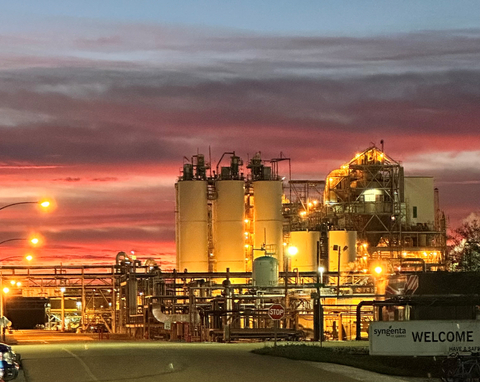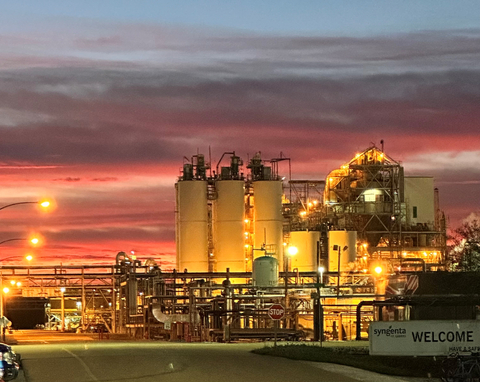BASEL, Switzerland--(BUSINESS WIRE)--Syngenta Group, one of the world’s leading global agriculture technology companies, announced today that its manufacturing facility in St Gabriel, Louisiana, U.S., has been recognized as a top user of green power by the U.S. Environmental Protection Agency (EPA). Syngenta is the only company within the agricultural sector to be included in the latest EPA’s National Top 100 List of top users of green power from the Green Power Partnership.
This recognition marks the latest milestone in the company’s actions to decarbonize its operations globally. Dr. Tom Gray, Head of Active Ingredient Strategy and Operations at Syngenta Group, said: “We are proud to be recognized by the U.S. Environmental Protection Agency for being a leader in the green power market. The implementation of our global strategy for sourcing renewable electricity is well underway, and we are working hard to decarbonize further and improve the energy efficiency of our operations. We are also collaborating closely with our partners throughout our global supply chain to decrease our entire carbon footprint.”
The St. Gabriel production site is one of Syngenta’s global manufacturing centers of excellence equipped to handle highly complex processes and meet the most stringent production and quality standards. The site consumes more than 150 million kWh of energy annually – equivalent to the annual electricity use of 14,000 homes in the country. Through the purchase of Renewable Energy Certificates, Syngenta’s site demonstrates that it sources 100 percent of its electrical energy from renewable sources such as wind and solar – fully offsetting its electricity consumption from fossil fuel-based sources.
Program Manager of EPA's Green Power Partnership James Critchfield said: “This list of the largest users of green power across the nation is proof that good business practices can also benefit the environment. EPA applauds the leading organizations in the Green Power Partnership’s Top Partner Rankings for their notable commitment to expanding their use of green power and protecting the environment.”
Globally, Syngenta has also invested significantly at its other production sites, as part of its published commitment to reduce carbon emissions by 2030. In Switzerland, Syngenta’s production site in Monthey uses hydropower for a sizeable portion of the site’s electricity needs and generates the equivalent of half its steam consumption by recovering heat from household waste incineration. In 2023, Syngenta’s Monthey site was awarded the “Go Carbon Free” label by the Carbon Free Valais Foundation, in recognition of its efforts to reduce its carbon footprint.
In Brazil, Syngenta’s R&D and manufacturing sites for its crop protection and seeds businesses – also source 100 percent of their electricity needs from renewable sources. This was achieved alongside comprehensive efforts aimed at reducing water consumption and waste generation, and at long-term net-zero energy sourcing.
In China, the Kunshan manufacturing site emerged as Syngenta Group China’s first carbon-neutral facility after Beijing Green Exchange, a platform for carbon emission trading in China, awarded it in July for fully offsetting its carbon emissions generated from its operations. The site is implementing continuous improvements such as real-time monitoring of electricity usage, alongside upgrading equipment to be more energy efficient.
“Syngenta is fully committed to a long-term journey to reduce greenhouse gas emissions in the running of our operations,” said Gray. “This is a key focus area for us, even as we drive innovation to enable farmers to adapt to climate change and increase the sustainability of agriculture. To this end, we have invested in building an internal function focused solely on Sustainable Operations, which will drive these and other initiatives designed to reduce both our own emissions and those of our value chain.”
About Syngenta Group
Syngenta Group is one of the world’s biggest agricultural technology companies, with roots going back more than 250 years. With more than 59,000 employees, operating in more than 100 countries, the company strives to transform food production through Regenerative Agriculture - a science-driven, technology-enabled approach to improve soil, deliver high productivity and high-quality food, help fight climate change and restore lost biodiversity. Syngenta Group, which is registered in Shanghai, China, and has its management headquarters in Switzerland, draws strength from its four business units: Syngenta Crop Protection, headquartered in Switzerland; Syngenta Seeds, headquartered in the United States; ADAMA®, headquartered in Israel; and Syngenta Group China. Together, these businesses provide industry-leading ways to serve customers around the world.
For Syngenta Group photos and videos, please visit the Syngenta Group Media Library.
Data protection is important to us. You are receiving this publication on the legal basis of Article 6 para 1 lit. f GDPR (“legitimate interest”). However, if you do not wish to receive further information about Syngenta Group, just send us a brief informal message and we will no longer process your details for this purpose. You can also find further details in our privacy statement.
Cautionary Statement Regarding Forward-Looking Statements
This document may contain forward-looking statements, which can be identified by terminology such as “expect,” “would,” “will,” “potential,” “plans,” “prospects,” “estimated,” “aiming,” “on track” and similar expressions. Such statements may be subject to risks and uncertainties that could cause the actual results to differ materially from these statements. For Syngenta Group, such risks and uncertainties include risks relating to legal proceedings, regulatory approvals, new product development, increasing competition, customer credit risk, general economic and market conditions, compliance and remediation, intellectual property rights, implementation of organizational changes, impairment of intangible assets, consumer perceptions of genetically modified crops and organisms or crop protection chemicals, climatic variations, fluctuations in exchange rates and/or grain prices, single source supply arrangements, political uncertainty, natural disasters, and breaches of data security or other disruptions of information technology. Syngenta Group assumes no obligation to update forward-looking statements to reflect actual results, changed assumptions or other factors.




